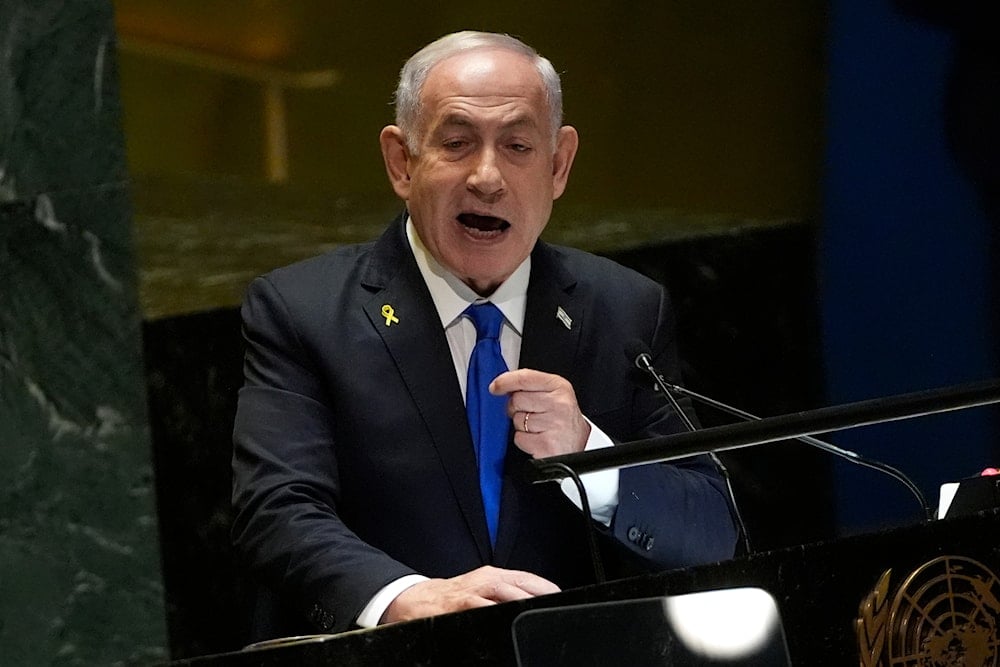Netanyahu approves ceasefire deal with Lebanon 'in principle': CNN
As Israeli officials, including Benjamin Netanyahu, allegedly seek a ceasefire resolution with Lebanon and Hezbollah, Police Minister Ben Gvir coins it a "grave mistake".
-

Prime Minister of "Israel" Benjamin Netanyahu addresses the 79th session of the United Nations General Assembly, on September 27, 2024 (AP)
Israeli Prime Minister Benjamin Netanyahu has reportedly approved a ceasefire with Lebanon "in principle" following security consultations held with Israeli officials late Sunday, an informed source told CNN.
Regardless, the source stated that "Israel" still had its reservations regarding certain details of the ceasefire, which are expected to be relayed to the Lebanese government on Monday. Negotiations to resolve all disputed issues are also expected before moving forward with an agreement.
Moreover, the agreement hinges on the Israeli cabinet's approval, which has not yet materialized.
Sources familiar with the negotiations have expressed optimism regarding the ceasefire, but remained wary as crossfire was still active, which risks ruining the chances for a truce.
On Sunday, Israeli Prime Minister Benjamin Netanyahu held "high-level consultations" on a mediated ceasefire agreement with the Islamic Resistance in Lebanon - Hezbollah, as reports indicate an Israeli inclination to accept a US-brokered agreement.
Reports have conflicted on whether Netanyahu has approved efforts to reach an agreement, with Israeli media outlets offering differing accounts.
The consultation included a few senior Israeli ministers and security officials, focusing on how Netanyahu "should present the agreement to the Israeli public after giving US mediator Amos Hochstein the green light to move ahead with the proposal."
While the government-funded Israeli Broadcasting Corporation (KAN) cited an Israeli official who said that there has been "no green light yet" for an agreement with Lebanon, Yedioth Ahronoth and Axios' Barak Ravid had also reported on a preliminary Israeli green light to a US-backed ceasefire deal.
'Historic failure' against Hezbollah
In a related context, Israeli officials claimed that a ceasefire in Lebanon would most likely be reached in the following days. Police Minister Itamar Ben Gvir, however, vehemently rejected an agreement, saying it would constitute a "historic failure" against Hezbollah.
"Israel's" ambassador to the United States, Mike Herzog, had told KAN that a deal was only a few days away, with only minor details left to be resolved.
Israeli Minister of Immigration and Absorption, Ofir Sofer, echoed Herzog's statement, adding, "It was always clear that this would not end with a military operation, but there would also be a political process, though the threat must be removed for the people of the north to return to their homes."
The ceasefire decision was also supported by strategic advisor Barak Sari, who claimed in an interview with Israeli Channel 12 that "Israel’s" interest is to reach a swift settlement with Lebanon, which is backed by military leaders, adding that the wars in Gaza and Lebanon must end.
Israeli Channel 14 also reported that an agreement had been reached to include France in the developing deal with Lebanon, signaling that "Israel" is closer than ever to a deal with Lebanon.
The Israeli newspaper Israel Hayom reported on a private discussion that took place on Sunday evening at Netanyahu's office, with the participation of the heads of the security establishment and ministers Katz, Sa'ar, Dermer, Smotrich, and Ben Gvir, during which the final details were agreed upon for a ceasefire deal with Lebanon, noting that "Israel decided to move forward with reaching an agreement in the near future."
Additionally, the newspaper pointed out that the potential agreement not only requires approval from the Israeli government and the Cabinet but must also be put before the Knesset for a vote, in line with the coalition's demand regarding the maritime deal with Lebanon.
The newspaper quoted a political official saying, "It is a matter of days, maybe less, before signing a settlement agreement with Lebanon," potentially indicating that significant progress has been made or that an unofficial agreement between "Israel" and Lebanon has already materialized.
Meanwhile, Ben Gvir expressed his opposition to the settlement, considering that a ceasefire in Lebanon would be a "grave mistake and a historic failure in eliminating Hezbollah."
Echoing Ben Gvir’s opinion, the head of the Mateh Asher regional council in the occupied north, Moshe Davidovitch, described the agreement being shaped with Lebanon as a "shame," saying "There is a huge failure on the part of the government, which is reverting to a pre-war mindset, seeking to buy calm at any cost."

 4 Min Read
4 Min Read









